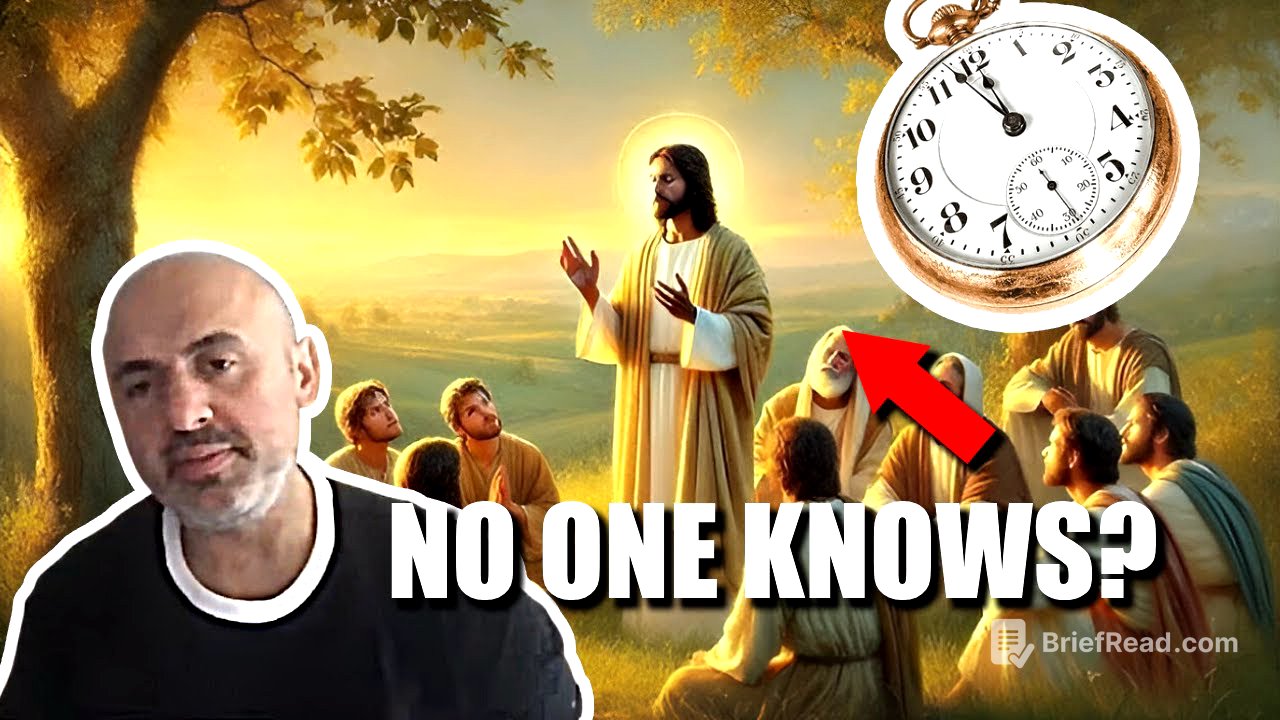TLDR;
This video addresses the apparent contradiction of Jesus, portrayed as Jehovah in the Gospels, not knowing everything, specifically "the day or hour" of his return. It explains that Jesus, as God, willingly took on human limitations, including a human mind with limited knowledge. This doesn't diminish his deity but highlights the complexity of his dual nature—both divine and human. The video also touches on how Christians and cults often overemphasise one nature over the other, and how this passage is misused by other religions.
- Jesus willingly accepted human limitations to experience the human condition fully.
- Jesus possesses both a divine nature with omniscience and a human nature with limited knowledge in his waking consciousness.
- Understanding the layers of human consciousness helps to comprehend how Jesus could not "know" something in his human state while still being God.
Mark and Matthew portray Jesus as Jehovah [0:00]
The speaker establishes that both Mark and Matthew intentionally depict Jesus as Jehovah God incarnate. This sets the stage for the central question: if Jesus is Jehovah, shouldn't he possess complete knowledge of all things? This initial assertion is crucial for understanding the subsequent discussion about the apparent limitations of Jesus's knowledge as portrayed in the Gospels.
If Jesus is God, why doesn’t He know everything? [0:33]
The speaker poses the question of why Jesus doesn't know "the day or hour" if he is Jehovah, who knows all things. The answer lies in the concept that Jehovah became man, taking on human limitations to fully experience the human condition, except for sin. This introduces the idea of Jesus having both divine omniscience and human limitations, which is a key point in understanding the Trinity.
Jesus became man and accepted human limitations [1:10]
The speaker elaborates on the idea that Jesus willingly took on human limitations. It shouldn't be surprising that Jesus, as a human, had to grow, learn, sleep, get tired, eat, and bathe. As a true human baby, he would have experienced pain and discomfort. This highlights the reality of Jesus's incarnation and his genuine experience of the human condition.
The reality of Jesus’ full humanity [2:15]
The speaker continues to emphasise the completeness of Jesus's humanity. To be truly human, Jesus had to experience hunger, thirst, and physical growth. He would have suffered from common ailments like earaches and colds. The speaker stresses that a true human mind cannot be omniscient, implying that Jesus's human mind also had limitations.
The impossibility of an omniscient human mind [3:33]
The speaker argues that if Jesus possessed a truly human mind, it couldn't be omniscient because no human mind is. If Jesus's human mind were all-knowing, he wouldn't be truly human, echoing Gnostic beliefs that deny the true humanity of Christ. This reinforces the importance of acknowledging both the divine and human natures of Jesus.
Divine and human natures in one Person [4:06]
The speaker explains that Jesus, as God, possesses omniscience, but as a man with a human mind, he cannot know everything. These two natures remain distinct within one person, fully possessing the attributes of both deity and humanity without mixing or confusing them. This concept, while difficult to fully comprehend, is presented as a biblical truth.
Christians overemphasizing deity, cults overemphasizing humanity [5:25]
The speaker points out that Christians often overemphasise Jesus's deity at the expense of his humanity, while cults or anti-Trinitarians do the opposite, sometimes denying his deity altogether. It's crucial to avoid saying that Jesus relinquished his deity, as God cannot cease being God. However, God doesn't always fully utilise all his attributes, just as the Father constrains himself.
Mark 13:32 in context: ascending order of creation [6:18]
Returning to Mark 13:32, the speaker explains that humans wouldn't know the hour because God is hidden from them unless he chooses to reveal himself. Even angels in heaven, who are close to God, don't know. The speaker presents a hierarchy: Creator, creation (angels, humans). Jesus places himself above all creation, differentiating himself from angels and humans, and claiming to be the true son of the Father.
Jesus places Himself above all created beings [7:22]
The speaker analyses Mark 13:32, highlighting that Jesus distinguishes himself from all of creation (angels and humans), placing himself above it and identifying as the true son of the Father. This implies that Jesus is on the same side as the Father, separate from creation, despite becoming human. This interpretation supports the deity of Christ even within a passage often used to argue against it.
Refuting Islamic misuse of Mark 13:32 [8:29]
The speaker addresses how Muslims might use Mark 13:32 to argue against Christ's deity. The speaker suggests countering by pointing out that the verse actually proves Jesus is the true son of the Father, greater than all creation, including Muhammad. This challenges the Muslim's belief that Jesus is not the son of God and that Muhammad is superior to him.
Jesus knows in divine nature, not in waking human consciousness [9:34]
The speaker clarifies that Jesus knows the hour in his divine nature but not in his waking human consciousness. As a man, Jesus only knows what the Father wants him to know and reveal. This distinction is crucial for understanding how Jesus can be both fully God and fully human, with different aspects of his being possessing different levels of knowledge.
Layers of human consciousness and Jesus’ knowledge [11:02]
The speaker uses the analogy of human consciousness to explain Jesus's knowledge. Humans have layers of consciousness, including a waking consciousness and a subconsciousness, where information is stored but not always accessible. Similarly, Jesus has layers of consciousness, with his waking human consciousness not having access to the full omniscience of his divine mind.
Why you shouldn’t be shocked Jesus didn’t “know” [13:02]
The speaker concludes by reiterating that it shouldn't be shocking that Jesus didn't "know" the day or hour on one level, as he only knew what the Father wanted him to know in his waking consciousness. Just as humans have deeper levels of subconscious knowledge, Jesus has a deeper human consciousness and a divine mind that knows far more than his waking consciousness. This reinforces the idea that Jesus's limitations in his human state don't negate his divine nature.









